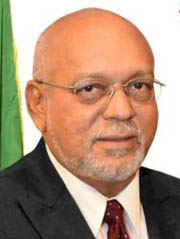President Donald Ramotar yesterday announced that he has instructed that moves be made to invoke penalty clauses in contractors’ contracts and if possible blacklist them if they continue to produce substandard work.
“I am asking the Ministry of Finance and the Attorney General Office to re-examine these laws (Procurement Laws) because I don’t think that the taxpayers must be paying for these things… we must put in the laws and that we must implement clauses in our contract for penalties for those who cannot complete their contracts,” he told a Public Procurement Symposium aimed at strengthening the procurement process while introducing new bidding documents to service providers. “I’m even asking them to re-examine the possibilities of blacklisting people such as contractors, engineers or consultants who consistently produce jobs that will cost us more money than it should actually cost us. I believe that is the only way we will get full value-for-hard-earned-money we spend in our society… these people should pay and not the taxpayers,” he added to thunderous applause and nodding approvals from a packed-to- capacity International Convention Centre.

Perturbed by what he said was wastage of valuable monies, when contractors request unnecessary extension dates on their contracts, Ramotar urged contractors not to take more jobs than they are capable of simultaneously undertaking. He dismissed excuses for extensions such as weather, saying that the real reason was a lack of capacity, while adding that many times when the media report on errant contractors, it is true. “Some of the variations that I see coming up, these variations are huge… very often it has to do with contractors who cannot finish their work because of capacity and making excuses for not having it done. Much of that is unacceptable to a poor country like ours that is struggling,” he said. “There is a lot of truth of what comes out in the press from time to time … we have to look practically. It is true that many of the jobs do overrun. Many jobs should have been completed but there is always application for extension after extension. This tells me they do not have the capacity to do all…when we have overruns it adds an additional cost to us and we must never forget that we are a poor, developing country and we cannot afford it,” he added.
Ramotar urged the National Procurement and Tender Administration Board’s (NPTAB) administration to rotate technical staff so as to not only share expertise but to have public confidence in the technical aspect of the procurement process. “I want broader participation of technical people. I want to see a rotation of technical people… I don’t want to see when I look at my cabinet papers the same name occurring all the time with the same type of areas. I want to see a rotation and participation of technical people evaluating bids,” he said. It was the president who also provided clarity to many contractors present on the awarding of contracts, informing that it was solely the duty of the NPTAB to award contracts and not the government as many perceive. To even some of the seasoned bidders, this point came as a surprise as some could be heard still doubting.
Said Ramotar, “Cabinet, as you know, does not award contracts… What they do is give a no objection. If we have concerns or questions we send it back to be reevaluated. We do not award contracts…we have put strong legislation in place in order to try as far as possible to ensure our system is fair and that we work under strict guidelines.”
Reiterating much of what was said at Thursday’s session when evaluators met, the President said that contracts are and will be awarded “strictly based on merit and nothing else.” He added that the symposium was held to interface with stakeholders as they aim to broaden the pool of bidders since he feels that is one way value for money will be had within the system itself. Minster of Finance Dr. Ashni Singh, who gave brief remarks, echoed much of what his Junior Minister Juan Edghill told stakeholders on Thursday, while boasting of transparency of Guyana’s procurement system compared to the Caribbean region and Latin America.
Not much feedback was given from a seemingly anxious room during the morning session. However, some concerns were raised such as the lengthy timeframe to acquire a National Insurance Certificate – a requirement for bidding, the difference between the lowest bid and the lowest responsive bid and collecting monies owed for contracts from government agencies, among others.
Contractors that Stabroek News spoke with at the end of the session had mixed views of the usefulness of the symposium. Most who criticised what they said was a “wasted day” did not disclose their names because they feared that they would be targeted when bidding.
One man who left, angrily said “they will talk what they think people want hear but we all know the truth; is either you can’t compete with the bid contractors when you bid for big contracts or the small ones going to who know who.” Others expressed satisfaction, given that they were edified as to the completing of the new bidding documents and because there were officials present clarify areas of doubt.




